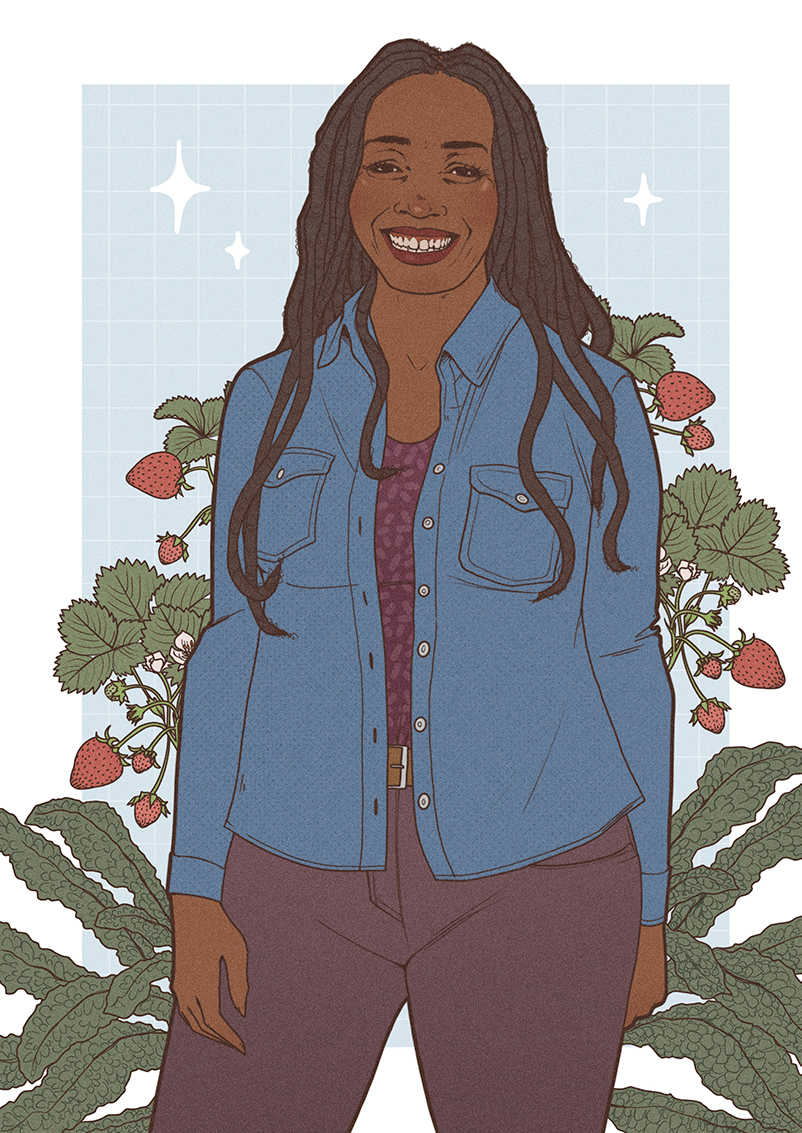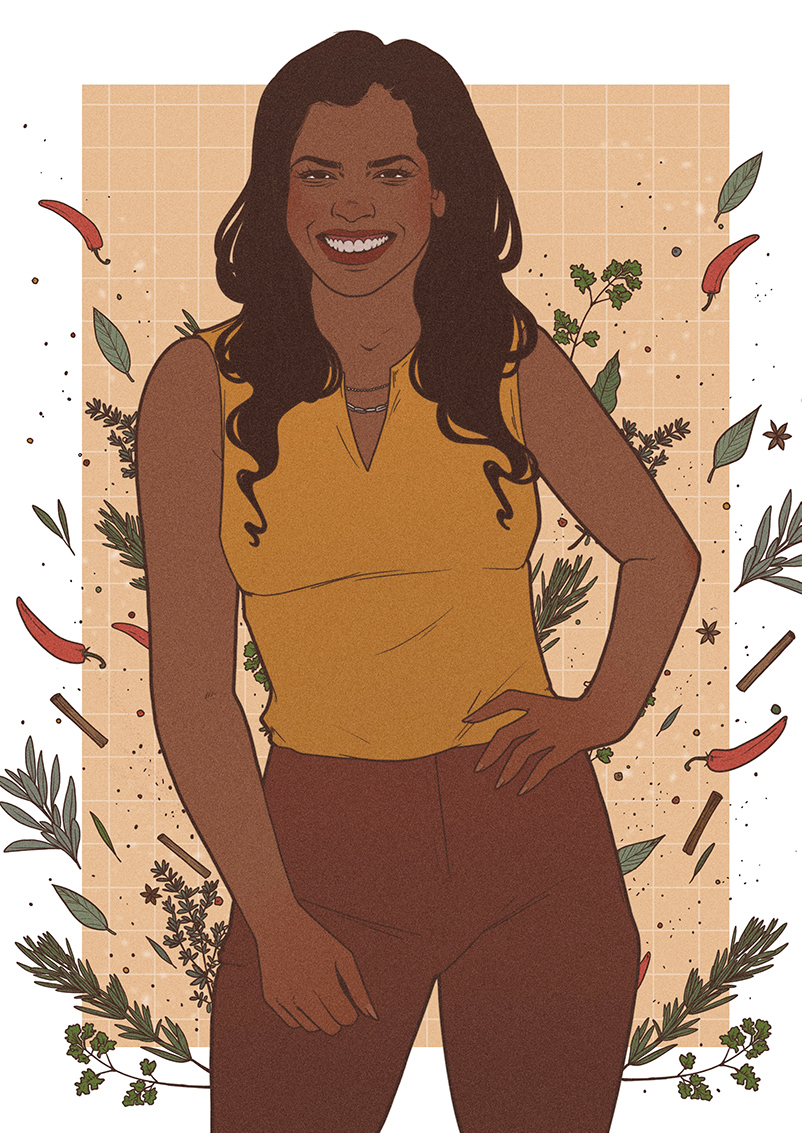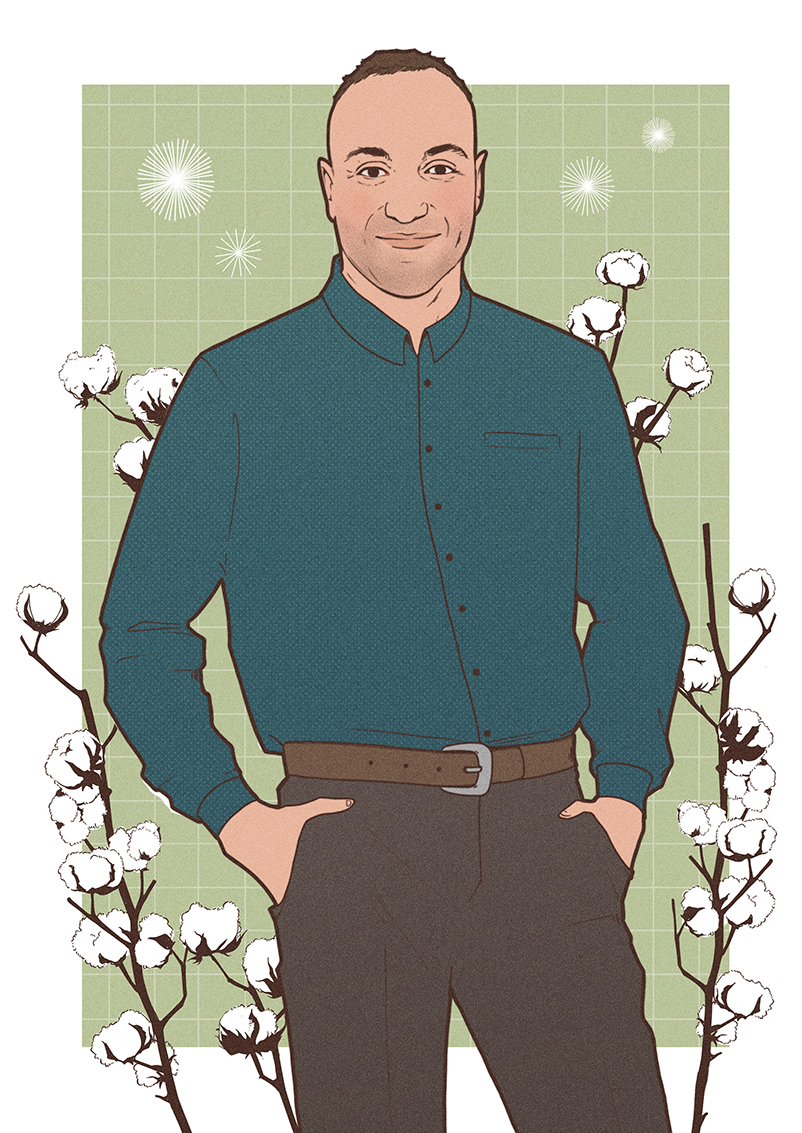It would be an understatement to say that 2020 has been an unprecedented year — in the organic space and every corner of the world. The pandemic has not been the only thing that’s forced us to re-examine our priorities, but amid that, the amplified fight for racial equity has served as a mirror to drive us out of a place of complacency. We must ask ourselves: How can we better understand the systems that helped or hindered how we got here? In what areas can we make space for the underrepresented who might not have had those advantages?
We would like to introduce you to four entrepreneurs of color who have broken barriers and, despite all the odds, have led their industries in the organic textiles, beauty, farming and food spaces. Because of their enterprising leadership and commitment to a more sustainable future, they are at the forefront of innovation in a political environment that has not recently put the Earth first. But we are stronger together, and with business owners like them, we can push the organic space forward toward a more inclusive future.

Jennifer Taylor, Lola’s Organic Farm
Jennifer Taylor’s grandmother, Lola, was a sharecropper with a second grade education. In the 1940s, she had the rare opportunity to buy a 32-acre piece of the land she worked with the money she had expertly saved.
“She made the choice to get out of her situation and to become a landowner. To have her own home. And to have her own crops and grow food for her own family,” said Taylor.
Though she could see it was hard work, Taylor could also see that Lola really loved on her farm.
“My earliest memories of the farm were visiting my grandmother and seeing how she was caring for the land and how much she was enjoying farming,” she said. “And there was lots of music, with people always playing instruments on the back porch.”
The family’s passion for quality produce grown by local farmers was passed down through her mother, too, as Taylor grew up in Tallahassee, Florida — about 175 miles away. Taylor’s mother would not only cook illustrious, Southern meals from scratch for the family, but would often make more than enough food to also share with their neighbors.
“She fed the neighborhood,” said Taylor.
Though the farm lay fallow after Lola grew older, the lessons passed down through the generations of Black women took root in Taylor, ultimately leading her and her husband, Ron Gilmore, to relocate to and organically farm on her family’s farm in Glenwood, Georgia, in 2010.
“Those early memories that I have of the farm are some of the things that helped me to lean in that direction to farm and study agronomy myself,” said Taylor, who studied at Florida A&M (1890 land grant institution) and Iowa State and Florida A&M, earning her doctorate at Virginia Polytechnic Institute and State University.
On her certified organic farm, Taylor grows sweet potatoes, Muscadine grapes, raspberries, blackberries, various fruit trees, kale, onions, garlic, turmeric and ginger.
They’re also testing out tomatoes and okra. Cover crops are employed for soil maintenance, including buckwheat, millet and subterranean clover.
“We have really seen an improvement by growing cover crops – not only in the pollinators but the function of the soil and its moisture content — and especially with managing weeds. It was something that we really needed to do because we do have competition with Bermuda grass, considered an invasive.” Compost, including earthworms, are employed in their soil management to help grow healthy soil.
Taylor’s role as an educator is never ceasing, as she and Gilmore often share their methods with their neighbors through on-farm workshops and intensive learning sessions.
“We try to share information with other farmers and gardeners, including the strategies that we found to be successful. We need to share about organic farming, the benefits of organic agriculture and farming systems, too — because we don’t live in a vacuum. How an organic farmer manages their land impacts not only their farm but their neighbors’ farm, and we never think about that,” said Taylor. “I feel that organic farmers are the stewards of their environment to the benefit of their local community.”
When asked about the future of farming for Black and Indigenous people, Taylor is optimistic.
“Black farmers, Indigenous farmers, and farmers of color have new opportunities to build new networks and new ways to provide and help the community,” she said. “And that gives us a different vision for our future. We can always take different strategies from the ways that we did things in the past. But we are seeing a change now, and we are now at a place where [there are] a lot of new opportunities in grants.”

Samantha Binkley, Healthy On You
When Samantha Binkley started her personal coaching business in San Diego, one of the goals she and her clients had for them was to improve the way they ate. Binkley began creating spice blends to brighten up their home cooking while keeping their food regimen healthful and nutritious. As she began to notice that not only her clients but her friends were increasingly requesting her spice blends, she realized that she would fulfill this need that was present in holistic cooking — a need for complex flavors that would enliven any kind of dish.
Binkley started to perfect her intercontinental blend concepts using all organic ingredients. Instead of using chemicals to clean the spices, she uses alcohol, which is naturally occurring. The result is gluten-free, non-GMO, USDA organic spices without fillers, preservatives or artificial flavors. And in 2015, Healthy On You was born. Drawing inspiration from a life deeply entrenched with music, she named her blends after puns of certain song titles that would loosely evoke the origin or mood of the spices.
“My husband is a songwriter, and music is really important in our lives, so you’ll see that in the spices,” she said.
The “No Woman No Spice” blend is evocative of Binkley’s Jamaican heritage and a Jerk blend with allspice, black pepper, habanero powder and more that’s perfect for chicken or fish. “Moroccan Round the Clock” captures the spices of the Middle East with cumin and coriander, and is well suited for lamb and roasted vegetables.
As an extension of her personal coaching background, Binkley also taught cooking classes before the pandemic. Luckily, the spices come supported with various recipes and suggested uses on her blog. She posts new recipes regularly to keep the blog content fresh so clients and customers can check back frequently. To bring the musical influences full circle, the spice blends also come with Spotify playlists that customers can listen to while preparing or enjoying meals for an entire feel.
“You get the full experience using all the senses with tastes, aromas, music — it’s all there,” Binkley said.
Binkley has 17 spice blends in all, which she formerly would personally distribute to each of her 14 shops. Sets of three are beautifully wrapped and sold as collections. Just recently, she started a contract with a new distributor and increased the total stores to 40 — and she doesn’t have to make the rounds herself, anymore. Natural food stores such as Bristol Farms, Erewhon, Jimbo’s and other local San Diegan storefronts carry Healthy On You spices.
Binkley says that the feedback she’s gotten about her organic spices has been overwhelmingly positive. Very simple dishes can really dazzle and impart intriguing flavors with just a few pinches.
“You can make anything in under a half-hour and have it taste so good and impress your family and friends so easily, with minimum effort, using these spice blends,” she said. Especially in the context of a pandemic, now has never been a better time for people to cook with them. “People are cooking at home more and getting better at it, so they have more opportunities to use my spices, and I’m happy that they can be there for them in their own kitchen.”

Mary-Andrée Ardouin-Guerrier, Loving Culture
When Mary-Andrée Ardouin-Guerrier started college, the grandmother who raised her started to undergo chronic illness. From cancer to renal failure, then hypertension and heart disease, the last 10 years of her life marked a difficult journey as she needed constant supervision. Later on, when Ardouin-Guerrier became a mother and her son was still in infancy, he started having his own health issues — later discovered to be allergies and sensory disintegration.
These experiences with two closest to her caused Ardouin-Guerrier to start questioning everything in our environment. Her curiosity led her down a rabbit hole of health and wellness, which she started writing about on her blog. What she learned was life-changing, and it caused her to stop straightening her hair.
“I used to be religious about it, but realized, wow — there are a lot of harsh chemicals in [hair product]. It was something I was addicted to all my life, culturally,” said Ardouin-Guerrier. “I thought, ‘Why are they adding formaldehyde to beauty products? Why are they using the same thing they use to embalm dead bodies?'” She knew that there had to be a better way, and drawing upon her West Indian and Haitian heritage, life’s experiences and ongoing education, came up with a solution that was none less than organic.
She cut off all her hair to begin anew, then realized she wanted to grow it out again and needed product to manage it.
“I started researching oils and herbs, but Caribbeans have been using herbs, spices and oils forever. I started delving into the science and chemistry behind it, then made the amazing concoction of my hair oil. My hair began really thriving,” Ardouin-Guerrier said. As family, friends and their friends started noticing how vibrant her hair was looking, they started requesting her hair oil for themselves. Soon, she started a store on Etsy, where it really began to take off.
Concurrent to her writing and selling her oil, she began to crave credibility in her pursuits and began her Master’s in Public Health Education at Columbia. She’s now completing her doctorate in the same study. But her new business, as with all businesses, had its ups and downs since its beginnings at Etsy. She had successfully enrolled in a local vendor program with the Columbia Small Business Development Center at the Business School, even lending to a rebrand of her product to what it is now, called Loving Culture. However, the program’s end goal of being sold at Whole Foods stores did not come to fruition because of its acquisition by Amazon.
Ardouin-Guerrier bounced back. She relaunched her brand, and, lo and behold, her organic hair oil began selling on Amazon. After a series of pop-ups around town, Loving Culture’s organic hair oil began to get more local recognition — even scoring a collaboration with Package Free Shop. As for her continued journey, her studies in health and wellness couldn’t be more integrated with her product and business model. She and her husband have learned how to manage and reintegrate their son’s sensory capabilities. It all comes down to education; in fact, she also teaches wellness classes at York College.
“I want to teach people about health and not just in the sense of avoiding toxins — but seeing your worth and your potential,” she said. “I think we can incorporate all of that when we talk about living a healthy lifestyle.”

Marlon Pando, White Lotus Home
After having been in the family business of neckties for many years, Marlon Pando, owner of White Lotus Home, confesses he’s not much a fan of wearing them, anymore. None of his 13 employees have to wear them in their 10,000-square-foot space, either. That doesn’t mean, however, that there isn’t great care put into everything they do.
“The more relaxed, the better. We show very good professionalism, but I just don’t like the act, you know?” said Pando.
That makes a lot of sense when your company is in the business of making everyone more relaxed. With its signature product line being its all-organic mattress, White Lotus Home is a leader in its field. Each mattress is handmade by one person at a time and ready for delivery between two to four weeks after ordering — far shorter than the months other companies require. They ship locally as well as to all over the world.
Many companies claim to be selling all-natural mattresses, but Pando can spot the copycats.
“You may have found there are a lot of green mattresses, but we keep it real. Ours have no coils, no metals, no glue. We’re the real deal organic,” he said. White Lotus Home uses a natural latex core and a soy-based, eco-friendly foam in some of them, but the most popular model is the organic, rapid wool mattress. “The organic cotton comes from Texas while the organic wool is sourced from the West Coast. We also use buckwheat from upstate New York. Ninety percent of the fibers and fabrics are grown in the United States.
A code requirement of all mattresses is that they maintain a certain level of fire retardancy. Most manufacturers will overwhelmingly accomplish this with chemicals. White Lotus Home, however, uses naturally fire-retardant wool to meet these standards. When he first bought the company 15 years ago, there was a definite niche the 40-year-old, women-founded company had been filling.
“[The mattress business] became so industrialized, and when people were making them, they never thought that using fire retardants and other things would cause reactions like that. Some of these things are related to SIDS and autism, apparently,” said Pando. He’s also gotten customer feedback about their finally being able to sleep on their foam material, which is unscented like the foams in so many other mattresses. But there are concrete reasons why business has been booming, and that is because his base has been diversifying.
The customer base of White Lotus Home has, in recent years past, started to usher in a new generation: “When I first took over, our audience primarily had high sensitivities and allergies. Those were number one. But now, millennials are all about being organic — it’s cool now,” said Pando. “The new generation is all into this. They ask questions because they want to know where it’s made, where the materials come from. I feel like we can really grow a lot.”
In fact, the way things are growing, Pando says the company will probably triple its business in the next couple years. He has his sights on Whole Foods and other distributors.



















